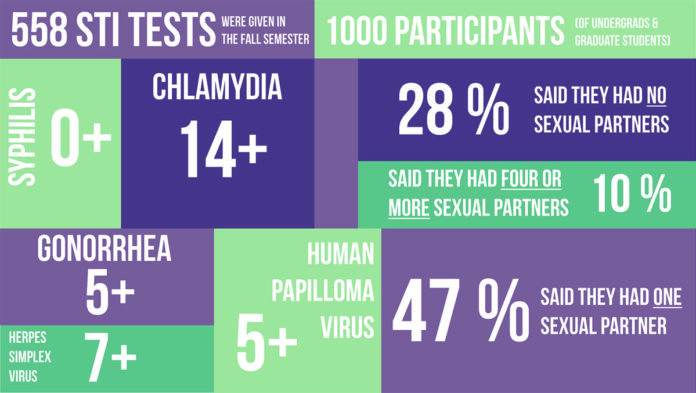Although the Student Health Center offers a variety of medical services, giving students access to the materials they need to practice safe sex is a high priority.
“Our overall goal is to provide any type of wellness help and support that a student may need in effort to reduce risky behaviors and to maintain a healthy lifestyle,” Coordinator of Health Promotion, Renee Bateman said.
To reduce risky behaviors, the Health Center provides numerous services for students, including sexually transmitted infection (STI) testing, contraceptive services and pregnancy tests.
During Fall 2016, 177 pregnancy tests were conducted at the Health Center, with six being positive. 78 emergency contraceptives (ECP) were also sold to students.
558 STI tests were given in the fall semester, although the total number also includes one student taking a test multiple times. In the results 14 were positive for chlamydia, five were positive for gonorrhea, seven were positive for herpes simplex virus (HSV), five positive for human papilloma virus (HPV) and zero were positive for syphilis.
Bateman said that syphilis had been a concern years ago , when an outbreak in Allegheny County resulted in SRU offering free clinics to increase testing.
Bateman said that chlamydia is typically the most positive STI on campus, which follows nationwide trends.
Students are given the treatment they need for any STI they may have and if the Health Center cannot help the student they will refer them to local health organizations in Butler or Grove City.
Surveys are also given out to students every other year, with the most recent survey in Spring 2016 receiving 1000 participants, consisting of graduate and undergraduate students.
“Our goal is to find out what’s going on with typical student behavior so we can offer appropriate programming and services,” Bateman said.
The survey reported that 28 percent of students that participated had no sexual partners, while 47 percent said they had one, with 10 percent reporting that they had four or more partners. (“Sexual partners” in this instance included oral, vaginal and anal intercourse.)
Bateman said that while a lot of students say they aren’t having sex, they are still engaging in something other than vaginal intercourse, which still has some risks.
“Students are reporting that they’re having oral, vaginal and anal intercourse and it’s important that no matter which way you choose to have sex those all carry a risk of sexually transmitted infections, so it’s important to protect yourself,” Bateman said. “What I’ve noticed working with students is that there’s a lot of students that are concerned about becoming pregnant and they are considered with protecting themselves from that, but they may not be protecting themselves from sexually transmitted infections.”
The Health Center offers condoms as well as dental dams to reduce the risk of STI transmission. Bateman said that there were 1032 students who bought safer sex products last semester. Condoms are purchased through the ‘Protection Connection’ or condom vending machine in the Health Center. Condoms are also offered in the Smith Student Center, the bathrooms in Boozel and on the second floor of Bailey Library.
“Something that we’re also looking at is expanding places where we offer products, but we also have to receive permission from the departments,” Bateman said.
While a lot of services are offered in the Health Center, the HOPE (Healthy Outreach Through Peer Education) peer educators host a lot of events and programs throughout SRU campus. They also are ones who sell condoms to students in the Health Center.
Bateman said there are currently 16 members of HOPE, which is student-run.
“I supply them with some of the trends and behaviors are being reported and based upon the need decide what programming and services do we need to supply for our students,” Bateman said. “They are trained really highly in the safer sex practices.”
Bateman said many of the events that HOPE has come by request, with most of the safer sex programs being conducted in the residence halls.
The Health Center also offers student health advisory boards, which is a forum where students can give input on what services they would like to see implemented.
Overall, Bateman said the Health Center is in a good place.
“What I’ve noticed is we’re way above the mark,” Bateman said. “There are some institutions that don’t provide any sexual health services to their students.”
Bateman said the Health Center is also one of about seven in the United States to offer 24/7 health services.
This allows the Health Center to help victims of sexual violence by providing care anytime, day or night. The Health Center also has 25 nurses and four nurse practitioners, with one registered nurse always in the facility.
“We’re doing most of the best practices that every university is offering,” Bateman said.
Bateman said that since the center is funded by student health services fees, the services provided won’t be affected by Congressional plans to repeal the Affordable Care Act and defund Planned Parenthood.
Bateman said the only impact it could have is if student insurance plans were to change,
“When I started working here, a lot of birth control was not covered through insurance, which meant you had to pay 30 dollars or more,” Bateman said. “Since the healthcare reform, you can get most insurance to cover it all. The day-to-day operations inside the health center won’t be impacted, but the insurance could definitely be an issue.”
Bateman said that if insurance changes, students would have to be referred out of the Health Center a lot more.
For now though, the Health Center helps to give students what they need to practice safe sex.
“We want students to make choices that are best for them and for their sexual health,” Bateman said. “We’re here to support them while they’re making those decisions, with the overarching goal being that the student is successful.”








